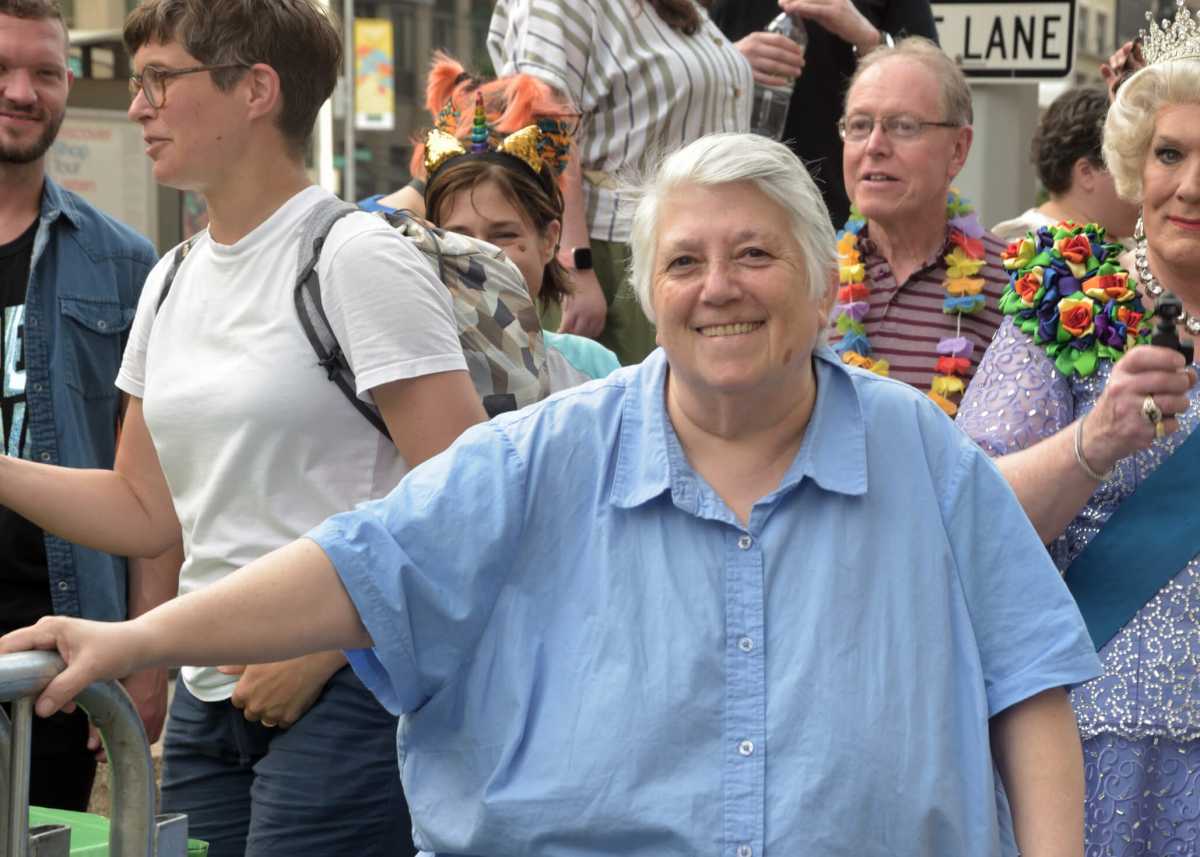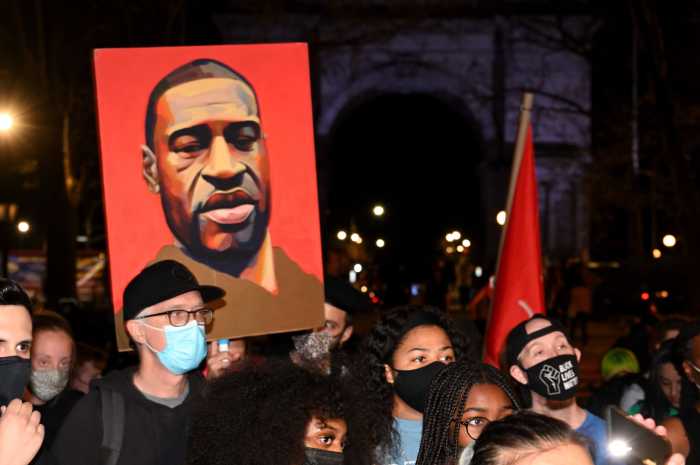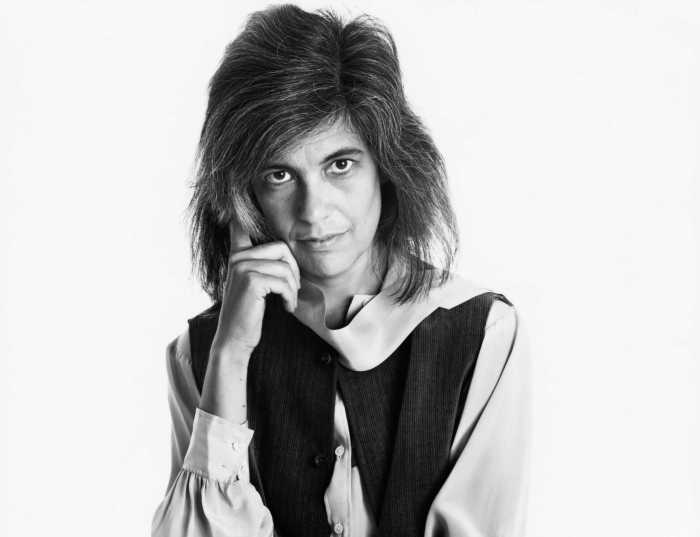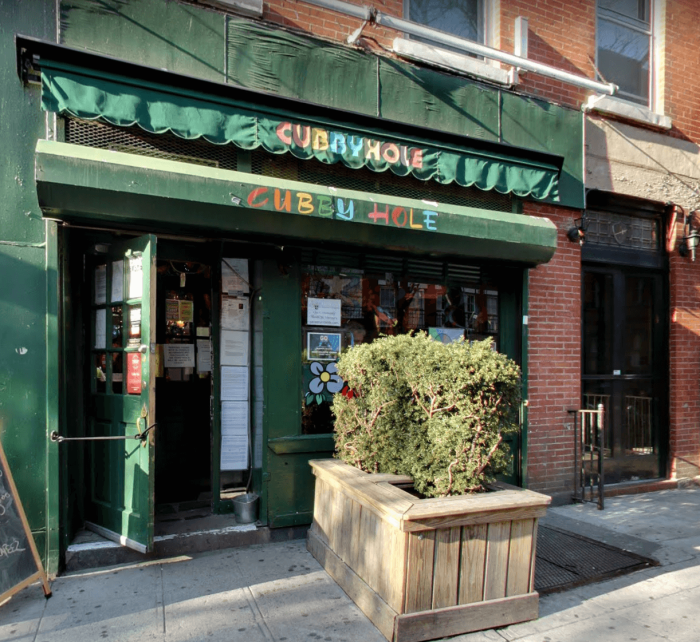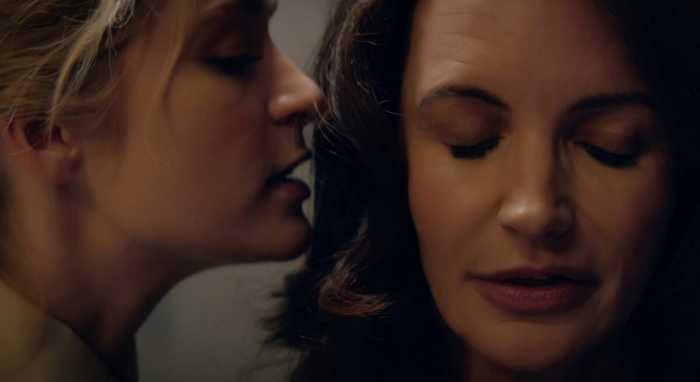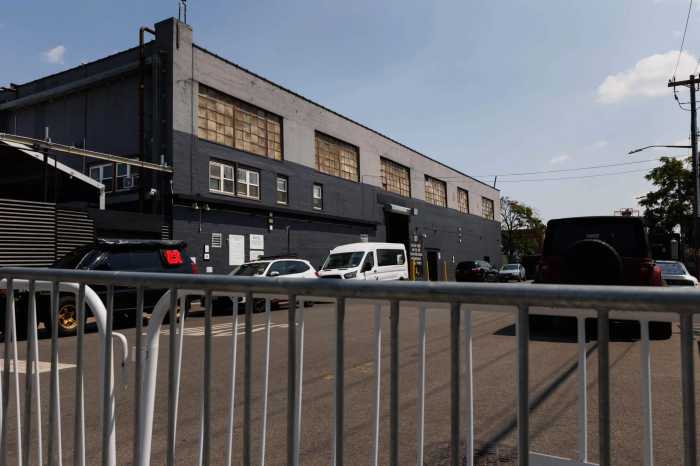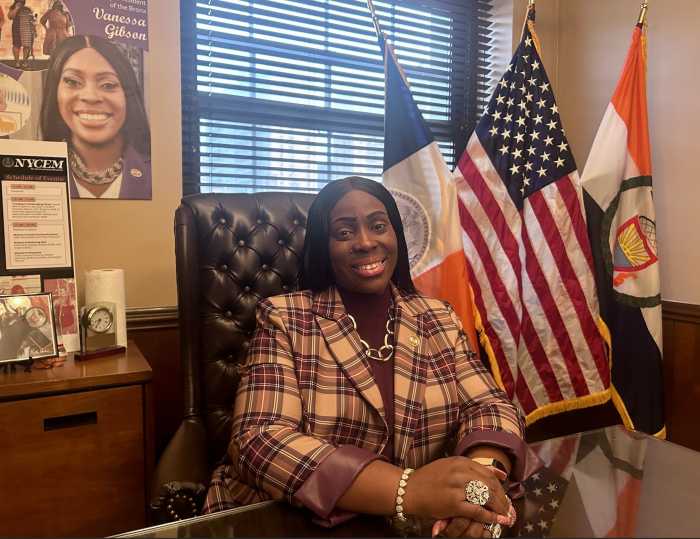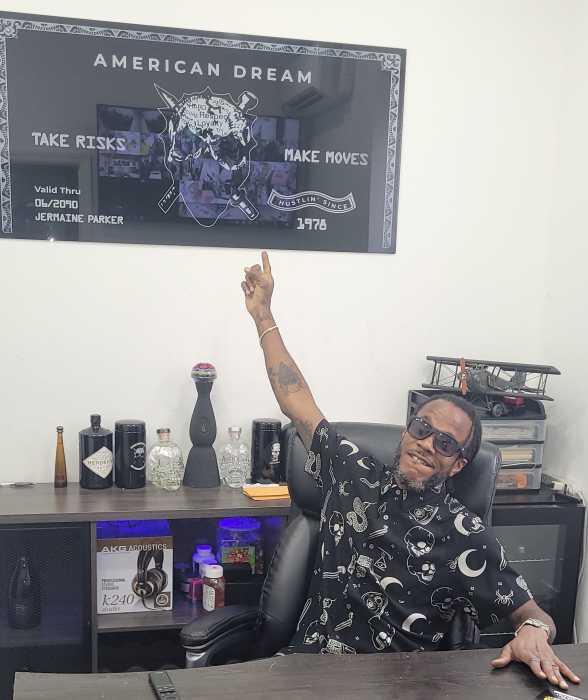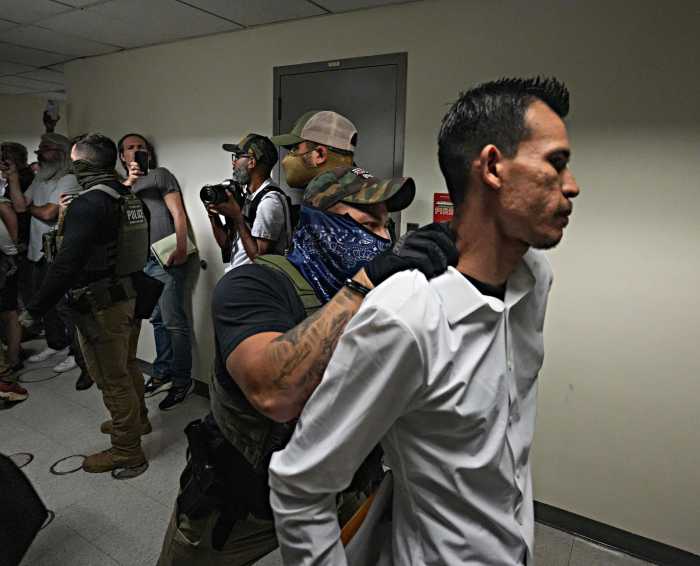On Saturday, June 26, I went to the 29th Annual NYC Dyke March. Well, I didn’t actually go to the whole march. It was hot and humid and I didn’t feel like I’d be able to do the full two-plus miles, so I headed to Washington Square Park where it would end, planning to join for the last few blocks.
I got there earlier than I thought I would, and immediately found a parking spot. (Sometimes it’s the small things that bring me great pleasure.) I was on Fifth Ave. a few blocks north of the park, perfect spot. Figured I could take a little nap in the car, but for some reason wasn’t able to fall asleep. Instead I watched as people and traffic went by, NYC having turned a corner on the COVID crisis. The pandemic is far from over but here in the city things are changing for the better.
It turned out I was parked at a church and there was a social event on the lawn in the front courtyard. People gathered, all looking happy to see one another. Hugs shared, lots of chatter, some people at tables and others standing around as the food was being prepared. The church had a banner out front that said they Celebrate LGBTQI+ Pride, and another one saying “Refugees and Immigrants Are Welcome,” and above the main entrance to the church a big Black Lives Matter sign. It all looked good.
Fully aware I knew nothing about these people or the dynamics between them, I noticed that of the 40 or so people there, I saw only five or six people of color. But what really stood out was that all of these folks (except the one man of color who was clearly working at the gathering) were sitting at a table together, and while some of the white people came over and chatted for a bit, none of them sat down. The scene provoked me to wonder what a true racial reckoning means in our daily lives. To be clear, I had no basis to assume bad intentions or behavior. But this small snapshot reminded me how complex our interactions with one another really are.
I looked the other way and realized I was right across the street from one of the NYU dorms. A memory from 1967/68 came rushing to the surface. I was a student at NYU and lived at home, but one of my closest friends was living in the dorm. During our activism against the US war in Vietnam, we had connected — strongly connected. One evening we were in her room and I found the courage to tell her I was attracted to her. All these years later I don’t recall the exact words, but I know I was clear that I wanted to sleep with her. (When I was 17 I had my first sexual relationship with a woman so I fully understood what my feelings were at this moment.) She seemed nervous, maybe scared, maybe both, and gently said no. That was okay. I wanted something else but I was fine and knew that our friendship was solid. Our connection was real and we would stay in one another’s lives, as friends.
A year or two later I returned to NYC after a trip away and learned that my friend was hospitalized because of an emotional breakdown. I went to see her but when I told the front desk who I was there to visit, they said that would not be possible. I never learned the details, but someone had decided that it would not be good for her to see me. I felt awful and confused: why could I not see my friend? I never did find out who made that decision or why, and while she and I saw each other from time to time over the next few years, we didn’t talk about it. To this day I can’t help but wonder if in some way it was connected to what had happened that night in her dorm.
There I was, waiting for the Dyke March and remembering how long being a lesbian was part of my self-definition. It seemed like it was taking forever for the march to arrive, so I got out of the car and walked up and down Fifth Ave. for a bit. I noticed a photographer also waiting for the march and it occurred to me that I should suggest that she take a photo of me with a caption that could say, “Old dyke waiting for Dyke March.” But by the time I decided to actually approach her with this idea she had disappeared. I still think it would have been cute.
Finally, the march was approaching and, as is pretty much always the case with any group marching in the streets of NYC, there were police officers in front of it. There was not a heavy presence and it didn’t feel tense or troubling, just another piece of the picture. (Let me be crystal clear: I am deeply critical of the ways the NY Police Department interacts with public protests and other events, as well as other terrible policing practices.)
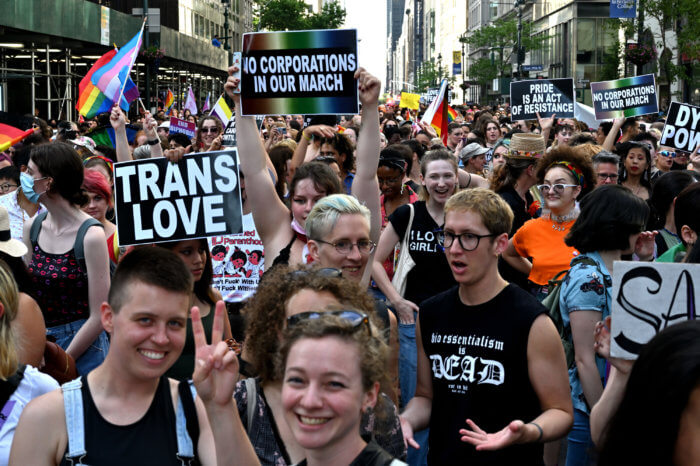
Coming up next was the Dykes on Bikes contingent — in the lead as they have always been. The bikes were loud and the exhaust fumes not very pleasant, but it was thrilling to see them! So out there, so proud, so excited, and simply so beautiful. I waved to an old friend and when they stopped to wait for the rest of the march to catch up, she jumped off her bike and came over to give and get a big hug. I could feel the energy of the Dykes on Bikes and the hug, in this coming-out-of-COVID period, was wonderful.
And then the waves of people marching behind the great big Dyke March banner. I had already run into and had a conversation with some old friends who were ahead of the march by a few blocks and they had said it looked like a pretty small turn out. But as the march went by I started to wonder if they had seen the same thing I was seeing. It was not the biggest march ever, but it certainly was not small! It went on for blocks and blocks and blocks.
Maybe halfway or two-thirds of the way into the march came the drummers, lots of drummers (looked like at least 35-40 people). Lots of bold, strong energy coming right at me and it felt contagious, in a good way!
As the march kept coming I found myself getting happier and happier. Right before my eyes, literally thousands of overwhelmingly young people in the Dyke March… and it brought great joy to this aging dyke. I admit that my instinct is to want to say “women” but I am saying “people” because I have no idea how all of those folks identify, and identity has gotten even more complex and textured than it always has been. I’m sure lots of them are dykes or lesbians, consciously choosing one or both of those words. But the main thing is that all of them had chosen to participate in the Dyke March with tons of dyke-loving energy and pride and boldness right out front. In this time when I, and others, are wondering with some trepidation about something we call “disappearing lesbians,” it was thrilling to see so many passionate, delighted revelers on Fifth Ave. behind the Dyke March Flag.
And it was wonderful to see the breadth of how people were expressing themselves. The theme of this year’s march was “Black Dyke Power,” and the diversity in race as well as in style and attitude and way of presenting to the world — it all made me feel grateful and proud. Holding that diversity was a palpable sense of community. I have no idea how deeply, or if at all, those marchers were experiencing that space as community, but for these few hours there was no ignoring the vividly evident love, mutual appreciation, and solidarity.
Over the years I’ve missed a lot of the Dyke Marches, but I know the organizers and the participants have always been attentive to the politics of race and sexual/gender identity, and how from the beginning it was always a space where every dyke-identified person was welcomed and celebrated. As I watched, and then jumped into the march, I also remembered, and know from my own experience over many decades, that dykes have been part of every struggle for justice throughout history. I found the pride welling up in me as I marched with old friends and thousands of young people knowing that this community will continue to keep fighting to help make sure everyone is free.
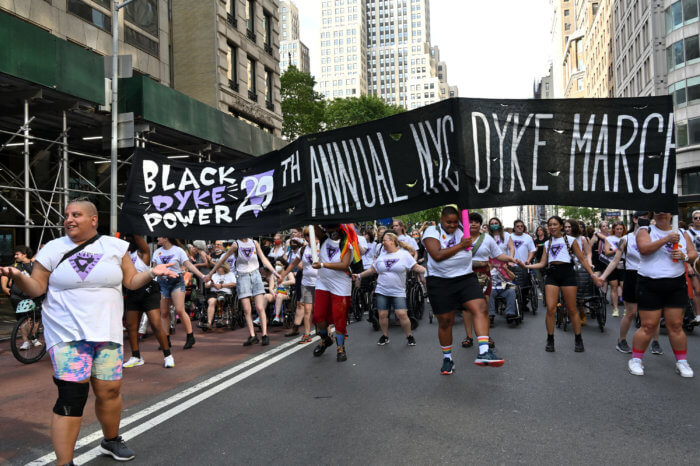
The great joy I felt from all of this was only strengthened by running into a number of old friends, connecting as we quickly tried to catch up, and lots of hugs. OMG, the hugs are a lifeline. It’s partly that we have been living through a global pandemic which has already taken close to four million lives, many of which are directly a result of the criminal negligence of the Trumps and Bolsonaros and Modis of the world. And it’s partly that we are still reeling from and still dealing with the Trump years as well as the aftermath and ongoing horror unleashed in this country.
As all of this was rumbling through my body, I was also remembering what this date, this event, means for my own life. Twenty-four years ago, poet/scholar/organizer Melanie Kaye/Kantrowitz and I, having earlier had just one lunch date, made plans for our second date at the Dyke March. I don’t recall why, but we had decided not to march together but instead to hook up in Washington Square Park at the end. I marched with friends and pretty much the whole way talked about how I was about to meet up with Melanie, and how excited I was. She marched with her friends.
Sure enough, we found one another and said goodbye to our friends. I recall words of encouragement from mine, as they could already see something was going to happen.
We spent another hour or more sitting in a quieter section of the park talking. We got hungry, found a Thai restaurant, and as we ate we kept talking. Then we walked around the Village for some time, talking. And finally, it was time to go home. We danced around it for a moment and I don’t recall who said it first, but we both knew we were going home together. She was staying with some friends in their small apartment, and while they are great people, we knew that would not work. I was staying for a stretch with an old friend but luckily she was out of town for the weekend and I had the apartment to myself… so that’s where we went.
It should come as no surprise that once there we talked and talked and talked. We were in the living room and at one point I was on the floor rolling a joint and she got off the couch, sat next to me, leaned over and kissed me. In a split second we were kissing each other, and not much longer after that we went to the bedroom.
And that’s how the Dyke March became our anniversary. We went to many of them together over the years, until going to anything became too hard for Melanie to manage. On July 10, it will be three years since she died. I get chills just writing that short sentence. While the pain and deep sadness has subsided over these three years I still miss her very much.
Being at this year’s Dyke March was also about something else for me. Yes, I missed Melanie through it all, but the strongest emotion of the evening was the thrill of seeing all of those young people with all of their passion and energy carrying forward the power and joy the Dyke March has always embodied for so many.

